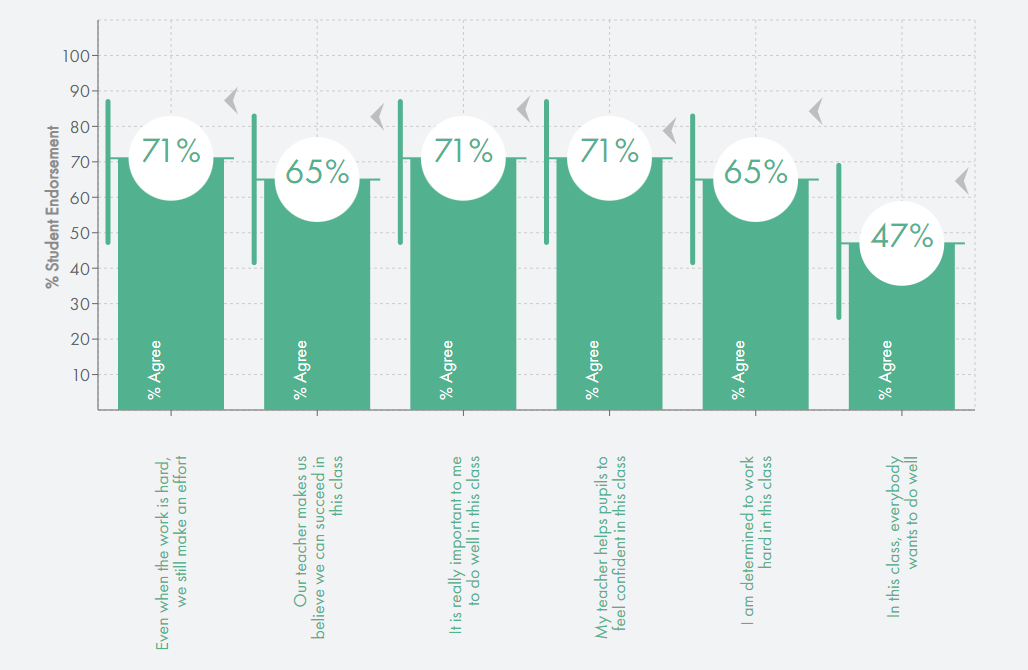By Stuart Kime
David Spencer, a music teacher at Nexus International School, has been using the student surveys from the Great Teaching Toolkit as part of a whole-school initiative. David spoke to us about how he used the feedback from the student surveys to identify a development area as part of his professional development. Connect with David on LinkedIn.
Why did you choose to use the student surveys from the Great Teaching Toolkit?
“I’ve been teaching for around 15 years, and I’ve always been involved in professional development teams, which can be quite unusual for a music teacher! One of the things that really differentiated the Great Teaching Toolkit from other PD was the student voice element – I’d never really seen anything like that before. The diagnostic nature of it is really useful and as it gives immediate feedback to teachers on very specific areas. Seeing everything quantified was hugely valuable and gave a sense of endless and immediate practice feedback”.
What actions did you take based on your feedback?
“It was pretty clear from my feedback that I was going to focus on ‘Dimension 2: Creating a supportive environment’. It was quite an eye opener to see that in one sub-strand, half of my students feedback that they were perhaps not pushing themselves in my lessons. The data also highlighted that I needed to make rules more explicit to my students – sometimes we can forget to do this with our students as they are high performing and very well behaved on the whole, but it is something really basic, and quick to fix. Disruption is only ever low-level given the nature of my school, so this was interesting. Making rules explicit and repeating these at each lesson juncture is obviously a simple strategy to implement, raising the overall environment.”

Figure 1: Student survey results from Dimension 2 – Creating a Supportive Environment, showing the percentage of students who agree with various statements related to classroom effort, teacher support, and overall motivation.
What actions did your school take based on the feedback?
“As a ‘Supportive Environments’ committee/working group, we noticed that student to student relationships were not as good as we thought in that students were perhaps not being as nice to each other as they could be. This theme was consistent in our working group. We found this really quite surprising as teacher-student relationships at our school are really positive.”
“As part of our professional development cycle, we came together in teams around eight or nine times in the space of 6 months. In these teams, which covered all departments and phases, we shared ideas and strategies that we’d been implementing in our classrooms from the ‘Supportive Environments’ toolkit module. It was really interesting to do this, as a lot of the strategies that were working across the school were strategies that we are all familiar with, but perhaps had just put to one side given the busy life of a teacher. Sharing ideas between teachers was extremely powerful and ultimately led to strong outcomes at classroom level.”
Did your students’ perceptions of the classroom match your perceptions?
“Absolutely not – I thought all of my students were trying their best all of the time! Through various school systems over the years I’ve been identified as a high-performing teacher consistently over many years, but the feedback in some areas from my students was a great eye opener. It has been really motivating. I think it’s really important to remember that learners are the experts of their learning experience, not the teachers – and student feedback is naturally measured in comparison to their other learning experiences, forming the obvious basis for opinion and consequently feedback. Students are experts in that they know immediately if a lesson is unplanned, under-resourced, or if an activity hasn’t been well thought out – they just know. They can be taught by several different teachers a day and are constantly making subconscious comparisons. On this basis the feedback diagnostic in the toolkit is hugely valuable”
Have you seen a change in your students’ perceptions?
“It has been really positive, particularly in the areas that I really focussed on, and as school everybody has moved in the right direction – this has been really motivating. Student voice should be used as much as possible – they will tell you everything you need to know. Seeing my scores shoot up over time was very satisfying”
Ready to implement student surveys at your school or college? Schedule a call, and our team will be in touch to help you get started!
Next case study
Next case study
Your next steps in becoming a Great Teaching school

